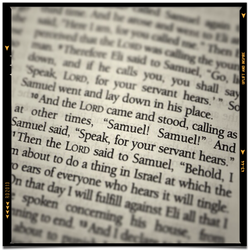 You know those moments, when your child says or does something that, in that beautiful childlike way brings things into focus? Yep, had one of those yesterday. I told the girls we were having some neighbors over for dinner and my oldest said to me, “Oh good, Mommy! I knew that was going to happen but I didn’t know when.” “How did you know?” I asked, just because I knew I had unintentionally neglected to tell them until that day. “I heard you tell Mrs. Jennifer about it in the car the other day,” she said. And then, the articulation of her heart: “I like to listen to grown-ups talk, Mommy. I do it all the time so I can know what’s going on. I don’t know why. I just like to listen to the grown-ups.” Now, I try to be mindful of what I say in front of the kids. I don’t want them hearing me be negative, anxious, or grumbly. I do want them to hear me say kind things, praise others and work out problems. So certainly, this was a reminder that I need to continue on that track. But it also brought to mind a phrase I first encountered as a child myself, reading The Little House on the Prairie series. Ma Ingalls would say, "Little pitchers have big ears." My child is listening to us. She wants to listen to us. And she does it with purpose: to learn. And then I wondered… Am I listening to the grownups? Do I hear what Christians who are older, wiser, more experienced are saying, both to me and to each other? Do I want to learn?—because here seems to be an easy way to. If I am listening to the grownups, what can I learn? A lot of them will tell me directly what I need to hear—thank God for those who take on the role of public and private teacher! But I have to be willing to show up, and to listen, and then to apply. Still others will talk to me about their experiences; share their experiences. There is so much to learn there, if I listen. A lot of times the struggle there is in making the time to listen to them. If I am too busy rush-rush-rushing around, I don’t have time to take in what they have to say. That’s a struggle while wife-ing and parenting, but probably a struggle I need to fight. Those who have been-there, done-that have, quite simply, been there and done that and almost always have a few tips and tricks that will save me pain and heartache in the long run. And then there are times I get the opportunity to listen to "the grown-ups" talk to each other. To hear their regrets, to hear the ways they care for each other, to “listen” to what their interactions with each other have to teach me about their hearts, and to mimic the good things they do. There is learning in the listening. But most importantly, am I listening to the ultimate grown-up, my Heavenly Father? Do I really want to learn? Because He has said so much to me in his word! I am his beloved child. Just like I want my children to learn what is good and right and true from what I say, so He wants me to learn those things from that He has said. One of the most infuriating things in my parenting is when one of the kids says “I didn’t hear you,” when the truth is, they weren’t listening to me. I have found that to make sure they are listening, I sometimes need to put my hands on their cheeks, gently turn their face to me and lock eyes with them. I’m pretty sure that in preserving scripture for us, God did the exact same thing for me. It is my job to listen. I need to lock my eyes with him, in devoted study of my Bible. Today I need to speak less, listen more. Find the grownups. Read what my Father is saying to me. Have big ears and hear it. Apply it. And the Lord came and stood, calling as at other times, “Samuel! Samuel!” And Samuel said, “Speak, for your servant hears.” 1 Samuel 3:10
3 Comments
 I want thankfulness to be my lifestyle. I want thankfulness to be my lifestyle. The time when I’m making dinner can be a vulnerable time for me, thought-wise. It’s often the first time after the events of the day where I am somewhat alone—the kids usually play and it’s just me and my thoughts while I cook. Often the activities of the day have left me somewhat tired and instead of having time to process the day I’m doing more work. Now, I love to cook, but this just seems to be a time where I’m able to be in my head, and that’s not always good. Last night I got to thinking about Mary and how much I will miss her. And there was that jolt of “I can’t believe she’s gone,” which is so often followed by what seems like an almost electrical jolt of sadness to my system. It is the kind of thing that can sometimes be a diving board straight into despair. But last night, just as I had that thought, it was hijacked by this most wonderful realization: “I am so thankful I got to know her.” Now, Mary knew a lot of people. A LOT. And because she loved people in general and because she wanted to serve God and them, I’d say she knew well many more people than most folks do. But in the grand scheme of the world, there are so many more people who didn’t get to know her. BUT I DID. And I am just so thankful that God allowed me some time with her. And it gave me a totally different perspective on what to think about during the many times she will be crossing my mind. “I miss her, but thank you, Lord, for letting me know her even just a little bit. I won’t waste that gift.” I like to think I’m a pretty grateful person, but this was revelatory for me. For the rest of the night, I decided to consciously practice gratitude, just to see what other thoughts I could turn on their head. I was making Breakfast-for-Dinner (yeah!), which involves my grandmother’s recipe for biscuits from scratch. I am pretty committed to cooking real food, but I gotta tell ya, cooking without convenience foods can be pretty…inconvenient. And while Breakfast-for-Dinner is pretty much the best thing in the world, I found myself looking at the bowl of flour and thinking of cleaning up bacon grease and cutting up watermelon. I felt a sigh coming on. And then…”I’m so thankful I get to do this.” I’m so thankful I have the means to do this. That I have a husband who supports us willingly so I can have the time to do it. That he even has a job. That we have two little girls who clamor for the biscuit dough and help set the table. And on and on till the biscuits were in the oven and we were ready to eat and truly offer thanks for dinner. Grateful. I won’t waste that gift. The other experiment came when I checked Facebook. One of the first things that came up was a picture of some people I know, having fun together. I hadn’t been invited. This is nothing new, and I don’t invite everyone I know to everything I do, nor do any of us have time to attend every gathering of every person we know every time they happen. And yet, I started to feel that feeling. Perhaps you know it? It’s the “Oh thanks Facebook for letting me know that other people are having fun together while I’m just here hanging out in my frumpy clothes with my phone” feeling. I hate discontentedness, and yet I could feel it coming on. And then… I hijacked the thought. “I’m so thankful they got to be together.” And I meant it, too. Perhaps it was just what they needed at that time. It was certainly a group that doesn’t get to be together often. I know how that feels and it is so good! I’m thankful that they were together, and that they got to get closer. Those are all good things and frankly, how self-centered of me to be even remotely jealous. I have good times, too—a lot of them. There are times where the reality is, I am thankful not to be asked to do more things because I tend to over-commit and then get stressed out. I’m truly thankful for all of it. And I won’t waste that gift. I intend to practice intentional gratitude again today. But going beyond gratitude, I intend to hijack as many negative thoughts as I can. We are in a war against Satan, who wants to steal our joy at every turn. This is a weapon against discontentedness and so many other joy-stealers that we are free to use, and it’s a powerful one. Strongholds: I am coming for you today. 3 For though we live in the world, we do not wage war as the world does. 4 The weapons we fight with are not the weapons of the world. On the contrary, they have divine power to demolish strongholds. 5 We demolish arguments and every pretension that sets itself up against the knowledge of God, and we take captive every thought to make it obedient to Christ. 2 Corinthians 10:3-5 Pray the simple prayer above; it will happen. May we all draw nearer to the God who made that ocean, those clouds, that sunset, and our eternal home.
7 Submit yourselves therefore to God. Resist the devil, and he will flee from you. 8 Draw near to God, and he will draw near to you. Cleanse your hands, you sinners, and purify your hearts, you double-minded. 9 Be wretched and mourn and weep. Let your laughter be turned to mourning and your joy to gloom. (James 4:7-9)  I started this morning with a bit of work in Robin’s study on How to Love Your Children. It’s very good—I recommend it if you have children or hope to be blessed with them. One thing I am inspired by every time I read it is Deuteronomy 6:1-13. “Hear, O Israel: The Lord our God, the Lord is one.[b] 5 You shall love the Lord your God with all your heart and with all your soul and with all your might. 6 And these words that I command you today shall be on your heart. 7 You shall teach them diligently to your children, and shall talk of them when you sit in your house, and when you walk by the way, and when you lie down, and when you rise. 8 You shall bind them as a sign on your hand, and they shall be as frontlets between your eyes. 9 You shall write them on the doorposts of your house and on your gates. 10 “And when the Lord your God brings you into the land that he swore to your fathers, to Abraham, to Isaac, and to Jacob, to give you—with great and good cities that you did not build, 11 and houses full of all good things that you did not fill, and cisterns that you did not dig, and vineyards and olive trees that you did not plant—and when you eat and are full, 12 then take care lest you forget the Lord, who brought you out of the land of Egypt, out of the house of slavery. 13 It is the Lord your God you shall fear. Him you shall serve and by his name you shall swear. “ It is a comfort to me that God has wanted his children to teach their children diligently since the beginning. If he told me to do it—I can do it! (Because he WANTS me to do it.) dil·i·gent [dil-i-juhnt adj. 1. constant in effort to accomplish something; attentive and persistent in doing anything: a diligent student. Look at that definition. God is giving us work to do here! It is every day work. It is all-through-the-day work. It is a constant effort. It has a goal, to accomplish something; you’ll find that in verse 12 above. I am to be attentive: I have to stop texting, take a break from cleaning, and interact with these children and figure out what they need to hear in order to never forget the Lord. I must be persistent in my teaching of God’s word. And He will help me do it (Phil. 4:13). Here’s what that looks like right now, for me: 1. Daily Bible study with the kids. We do this as part of our homeschool curriculum, but you can do it whenever you are together with your kids. A book like Egermeier’s has easily digestible lessons with questions to ask at the end. It makes it easy and my kids beg me to read more than one. Working together to do their Bible lessons for class at church is part of this, too. Someone once told me that kids find it embarrassing to be unprepared for class, so that's an added motivation, too. 2. Learning hymns and songs. This is what I remember most from being a child—the songs we sang. The words comfort me and since those songs are rooted in scripture, they remind me of what the Lord has done for me. I want to impart that to my children. It’s one of the reasons I’m working to set their memory work to song. These don't have to be kids songs, by the way. We do a lot of vocabulary work in explaining what some of the more 'stately' hymns mean. It helps me, too. 3. Being in nature. Children always find things to look at when you are in the woods or even just paying attention to the sunrise/sunset or the growing things in your front yard. “Who made that? Isn’t it amazing what God has done?” Is a constant refrain in our house. When they start asking the “Why did God make that?” questions, things get really interesting! (P.S. if you exercise them well in the outdoors they will be calmer and sleep better, too. You might find that you enjoy this benefit as well.) 4. Being around other Christians, of all ages. Teenagers love little kids and can be a great example and friend to your children. Parents with kids older than yours will remember theirs fondly when they look at yours, and will help pinpoint areas in which yours can be encouraged and more disciplined. Older Christians will actively seek to teach your children and to show them affection. These are special relationships that my children treasure. I do, too. 5. Taking them to evening or weekend Bible studies and singings. Mine are really starting to see this as a way of life, and they are learn to sit, behave, and even participate. If you take it seriously, they will learn to take it seriously, too. At almost-6 and almost-8, mine love to sit with different people (often the teenagers I mentioned above), they love to be able to find and even index a song in the hymnal, and they like to pick out a song to request. Added bonus: we are all getting to know new people better. 6. Thankfulness, thankfulness, thankfulness. My kids start their prayers now as their father does: “Our Father in Heaven, thank you for this wonderful day.” If we can see every day as Full of Wonder, because of how God has ordered things, then gratitude for everything about it comes more easily. It helps us set the tone in our house for teaching thankfulness for the things we HAVE been blessed with, instead of complaining about the things we don’t have. It is a lesson that, I myself need help putting in practice every day… especially when I get on Pinterest. Amen? I’d love to hear how you teach diligently, as we look for ways to know God and make Him known. Especially if you have kids in different age ranges than mine, I want to know what this looks like in your home. Share, please!  "Blessed be the God and Father of our Lord Jesus Christ, the Father of mercies and God of all comfort, 4 who comforts us in all our affliction, so that we may be able to comfort those who are in any affliction, with the comfort with which we ourselves are comforted by God." 2 Thess. 1:3-4 My mother is a psychologist. A helper. She has counseled countless people, and so many of them are ‘secret’ from anyone because of confidentiality laws. But beyond her paying clients she has also privately counseled many Christians just because… that’s what she does. She listens and she helps (my dad, a minister, does his share of this, too). Thus, I sometimes forget that not everyone has a psychologist in their family, so not everyone grew up with copies of the DSM-IV sitting around, or being gifted the now-defunct board game “Therapy,” and that not everyone knows the terms that we have always thrown around in conversation. Yes, I grew up with words like “behavior modification” (using systems to increase the desired behaviors and/or decrease problem behaviors.), “projection” (assuming other’s view of the world is the same as your own), or “FOO” (family of origin) rolling off my tongue. (You didn't?!?) I realized this week that a lot of people don’t know about the stages of grief. And I’m around a lot of grieving people this week. So I wanted to throw them out there in case knowing about them might be helpful to anyone going through this process. And it is a PROCESS. Process (pros-es): n. a continuous action, operation, or series of changes taking place in a definite manner: the process of decay. So, I hope you take away from that that it's not necessarily going to happen overnight. It may take time. Sometimes it takes a lot of time. I am not saying that it's right to wallow in grief (that would be ‘grieving as the world’ 1 Thess. 4:13), but it’s okay to recognize what’s happening. God gave us emotions, and we are capable of controlling them (Eph. 4:26). Often, if we will be quiet and listen to them, emotions serve as warning signs. Knowing those signs can help you to pray more specifically to God about His help. They can also help you articulate what's on your heart to a caring Christian who can help you, too. So, without further ado: The Five Stages of Grief. My non-psychologist brain remembers that not everyone goes through these at the same time or in the same stage; apparently there is no real timeline. And isn’t that also a blessing? We can give each other some perspective as we go through this since even those of us mourning the same thing will be in different places in our grief. Here are the stages of grief, as described by WebMD:
May God bring us swiftly through the stages that leave us so foggy and to a place of acceptance and joy in His care. Lord, keep us ever-mindful that there are "No tears in Heaven." "And the ransomed of the Lord shall return and come to Zion with singing; everlasting joy shall be upon their heads; they shall obtain gladness and joy, and sorrow and sighing shall flee away. " Isaiah 51:11  That's Mary behind me. I should've been hugging her instead of that stupid sign. That's Mary behind me. I should've been hugging her instead of that stupid sign. I have been in a fog for the last 10 days or so, ever since receiving the word that a dear friend, sister in Christ, and mentor was nearing the end of a long battle with cancer. She left this earth on Monday and I confess I am in full-on Grief Stage 1-Denial & Isolation. I can’t adequately express what Mary meant to me; not sure I fully grasp the loss yet, even. She was a constant in my life for over 10 years. But more than a simple constant, she was an unwavering rock, the very definition of perseverance. She served, and served, and served others till the end. She was not old, but she followed the Lord, and so because she was older than me, she taught me to love my husband and children (Titus 2). She showed me how to serve (endlessly, tirelessly. I’m still trying to learn this lesson). She modeled self-control, purity of heart, the joy of making a happy home (that was open to so many people, so often). She was kind. She was submissive to her husband, who valued and respected and loves her so much. Mary was so many things that the world would not value. Not in the least. “Just a housewife,” they say about women like her. “Just a mother,” the smirk. She lived a quiet life. Had no fancy titles or letters behind her name. No, she just did a lot of work. Worked with her hands, did hard spiritual work on herself and for others—oh, how she worked. But Mary wasn’t here to impress the world. She was dedicated to being everything that God values. A true servant. A pure heart. A beloved child. She mothered four sons, plus three daughters-in-law, several nieces and nephews and a slew of friends and loved ones. I don’t think she had a grand master plan to affect so many people. I think she woke up in the morning, studied her Bible so she would be ready, then opened her eyes to what was around her. She saw the next thing to do for the Lord, and did it. Now so many of us are left, like the mourners of Acts 9, fingering the figurative tunics and other garments that she left for us. Weeping. Wondering how to fill this void. There will be no miraculous raising of our beloved Tabitha here on earth—and for that, we are so thankful, since her raising will be done for eternity in Heaven. I suppose that one by one, there will be those of us who were touched by her who will pick up a little bit of service here, a good deed there. God’s will will still be done, it will just look different. The beautiful thing is, it’s not the life, or even the death of Mary that compels us to service—and she wouldn’t want it to be. It is the death and resurrection of our Lord Jesus that drove her to show love, and compassion, and to do good for others. May I be so moved, every day. P.S. Oh, and in the notes about Mary’s funeral service, this woman that surely would not impress the world or make a lasting mark? It says the service had to be moved to a huge church building because the funeral home is “anticipating a larger crowd than they can accommodate.” All because she served. Lord, make us pure-hearted servants. |
Encouragement Spoken Here
"A word fitly spoken is like apples of gold in a setting of silver." Proverbs 25:11 Archives
December 2016
Categories
All
|

 RSS Feed
RSS Feed